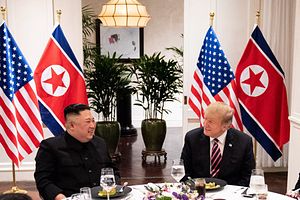Despite the final presidential debate between Donald Trump and Joe Biden being billed as a discussion about foreign policy, there was very little time devoted to the topic. North Korea was the notable exception – and for good reason. The next president of the United States, whoever he is, will be faced with the question of what to do about North Korea and its growing arsenal of nuclear weapons and ballistic missiles.
If there is one commonality between the last three U.S. administrations, it’s their inability to persuade or pressure North Korea into parting ways with its nuclear weapons program. This failure, however, has less to do with the talents of any particular U.S. negotiator and is more about the infeasibility of what the U.S. is trying to achieve.
Whether we like it or not, Pyongyang is not likely to eliminate its nuclear arsenal. The sooner Washington accepts this disappointing but cold, hard reality, the sooner the next U.S. administration can formulate a North Korea policy that has a greater chance of success. Any new U.S. policy should have risk reduction, peace, and normalization – not denuclearization – as the ultimate objectives.
It is easy to look at developments with North Korea over the last four years and feel a sense of dread. Despite two summit meetings with North Korean leader Kim Jong Un and a spontaneous meet-up at the Demilitarized Zone, President Donald Trump’s top-down style has not made headway on the North’s denuclearization. The last substantive nuclear talks between Washington and Pyongyang occurred a year ago, when the chief North Korean negotiator left the room in a fit of pique after several hours. While Trump continues to insist his relationship with Kim is solid, as he did during the final presidential debate, the positive one-on-one dynamic has not percolated down to the working level or constructively impacted bilateral relations.
The last several months have reinforced this conclusion. Even as it was talking with Washington, North Korea increased its production of fissile material. The Kim dynasty is as resistant to international monitoring of its plutonium and enrichment facilities today as it was 10 years ago. This month’s unveiling of the Hwasong-16 ICBM, a missile that could carry double the payload compared to its previously produced ICBM, is yet more proof of the North’s disinterest in the denuclearization Washington seeks. The general perception dominating the discourse is that the North Korean threat to the United States is now greater than it was a year earlier.
The reality, however, is not so frightening. While it’s undeniably true that North Korea possesses the theoretical capability to launch a nuclear attack on any corner of the continental U.S., it is also true that the prospects of Pyongyang actually ordering such an attack is infinitesimal. As scary as the North’s new ICBM looks, there is no scenario available in which Pyongyang would be able to use it without experiencing an even more destructive and regime-ending counterattack.
In stressing the defensive nature of the system during his address to the nation this month, Kim Jong Un essentially admitted as much. For a man whose top priority is keeping himself in power and warding off a hypothetical U.S. invasion, launching a nuclear-tipped missile at the U.S. homeland, Guam, South Korea, Japan, or any other area where U.S. troops reside would be breathtakingly stupid – not to mention downright suicidal. While denuclearization can still be a long-term objective, U.S. security is not dependent on it.
Washington, therefore, should spend far less time on what it doesn’t need and reorient the way it approaches the North Korea issue. This would require a more pragmatic set of goals and aspirations and a greater willingness to be flexible in pursuing them.
One of these goals is the official termination of the Korean War, a piece of low-hanging fruit that Washington, Seoul, Pyongyang, and Beijing all presumably support. The signing of a peace treaty ending the war would be an easy win for all sides and would entail little risk on the part of the United States. It could also end decades of systemic hostility between Washington and Pyongyang, thereby helping neutralize the Kim dynasty’s justification for why it continues its program of military modernization.
Washington should also drop the unhelpful habit of assuming normalizing relations with a state is some kind of reward or concession for bad behavior. History is full of examples of the U.S. meeting, talking, and negotiating with adversaries whose foreign policy was largely contrary to its own – relations between the U.S. and the Soviet Union being the most obvious. If the U.S. could engage in normalization with an existential threat like the Soviet Union, which resulted in arms control agreements and a peaceful conclusion of the Cold War, there is little reason why it couldn’t do so with North Korea – a vastly inferior threat to the U.S. militarily, economically, and geopolitically.
Most modern-day presidents enter the White House believing they are well positioned to solve the North Korea problem. All of them leave office coming up short. Regardless of whether it is Donald Trump or Joe Biden taking the oath next January, the next president can break the losing streak by being clear-eyed about what the United States needs from the North, what it can realistically get, and how it can get it.
Daniel R. DePetris is a fellow at Defense Priorities and a columnist at the Washington Examiner.































